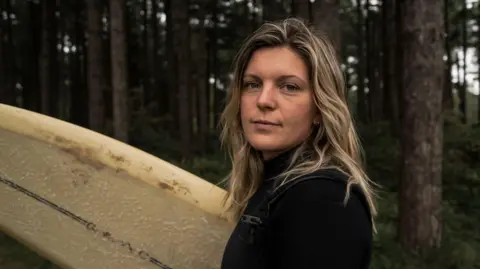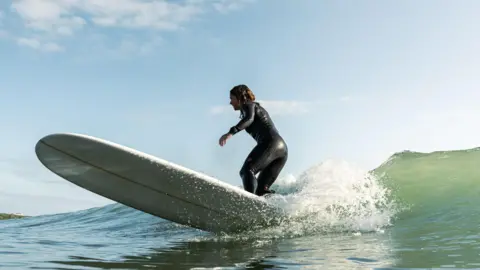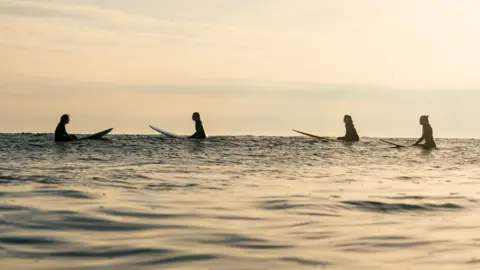'I was prescribed surfing to help my depression'
 Carys Griffiths
Carys GriffithsIn the depths of winter most of us want to curl up in the warm, but not Laura Truelove.
You will find her pulling on her wetsuit, gloves and boots getting ready to surf - a sport typically associated with the summer months.
Ms Truelove, who shares her passion through a magazine and podcast called Daughters of the Sea, said surfing helped her "wash away" her depression and anxiety 10 years ago.
She has also witnessed an increase in the number of female surfers in the last decade, adding that female surf clubs were important in helping women find a sense of community.
"I don't think people really realise the waves are actually better in the winter, that's why we surf throughout," said Ms Truelove, 30, from Gower, Swansea.
"You'll often go down to the beach in the summer and the water will be flat - we just don't get those sort of pressure systems and swells in the summer."
She added that, because she is pregnant, people had commented that she would not miss surfing because it is the winter.
"I'm like, 'It's the best time of year'."
She also thinks the coast is at its "most thrilling" in winter, with the "roaring waves and the rugged weather".
"We absolutely love it when we're in wetsuits and boots and gloves, it doesn't feel cold to us. We're pretty well equipped to deal with those temperatures," she said.
 Carys Griffiths
Carys GriffithsMs Truelove said that when she started surfing a decade ago it felt like "there were very few women in the water".
"A lot of line-ups can have quite a lot of masculine energy, be very territorial and unfriendly - but I think that does depend where you go."
However, she said she has seen a "huge change" in the last decade with more women taking up surfing, adding that it is important to have safe spaces like surf clubs that let women find community.
Ms Truelove began Daughters of the Sea - the name which comes from the Welsh myth about three daughters who were stolen by the god of the sea - in 2018 after attending a talk by the Institute for Women Surfers.
It was here she discovered other female surfers felt the same as her, frustrated that women's surf magazines always pictured "women surfing in bikinis and in warm climates".
"I just felt like they didn't represent me and my friends who surf all year round in the cold water in wetsuits."
 Carys Griffiths
Carys GriffithsAfter experiencing depression and anxiety while at university in Aberystwyth, Ms Truelove said she went to see a doctor, telling them she thought she was "broken".
She said the doctor asked her what she enjoyed, and she said she had recently joined a surf club and liked being around water.
"The doctor basically prescribed surfing," she said, adding that she was urged to surf every day before she went on medication.
"It certainly helped, I never went down the road of medication," she said. "I know now if I've got that feeling of anxiety, I just need to go for a swim or a surf and wash it all away."
Ms Truelove added that everyone has "their own story to tell" when it comes to loving the ocean.
"The feeling of catching a wave is an addictive feeling, but even just being around the water draws us back time and time again."
